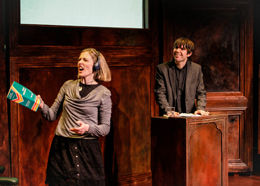“Tuigeann sibh go léir, yeah? You all speak Irish? Oh, some of you don't.”
TEAM Educational Theatre Company presents a bilingual play for older teenagers in which the Irish language is on life support. So, too, is its greatest scholar. His son, Anraí, is thus left with the task of presenting his father's lecture, but Anraí, a native Irish speaker, gives this lecture in Irish to an audience who barely understands. The dichotomy lies between Anraí's growing hatred of the language, which he regards as futile and ultimately dead in modern society, and cailín nua-Ghaeilgeoir's newfound love for the language which has given new meaning to her life – an ongoing debate in contemporary Ireland, particularly with regards to our education system.
From the moment the audience walks into the theatre, we feel as if we are waiting for a lecture to start. The set designed by Sabine Dargent gives the impression of a (very well-funded) college lecture theatre, with mahogany wall panels and mahogany flooring, and comprises of a lectern (centre-stage) and a large projector screen mounted directly above it, a desk holding many meticulously placed English-Irish dictionaries, a green leather chair and an easel with a pencil drawing of a man. Although the easel and drawing are never referenced, the bicycle helmet and bag which sit beneath it add a pointed sense of life and vitality to the otherwise vacant scene. The costumes consist of dark greys and blacks for both characters; it might have been an interesting choice to add a hint of colour to Cailín's costume in order to illustrate the contrast between both views of the Irish language which are at play here.
Both characters, “Man” (Anraí) and “Cailín”, are rather two-dimensional, and we don’t learn a huge amount about either of them, except for a brief glimpse into Cailín’s personal life through her diary, which seems a rather feeble and failed attempt to connect with their young target audience. Cailín welcomes the audience in a mixture of Irish and English and, after the introduction of surtitles, she begins to tell us in quite sophisticated Irish about a seemingly mundane incident in Tesco where she heard a mother correct her son not only in Irish, but in grammatically correct Irish. This was an epiphanic moment for her, and it is hinted that the play is desired to be an epiphany for its audience, one which would reignite their love of Gaeilge and encourage them to keep the language alive. Unfortunately, the production falls short of its desired effect. Focal Point is a reworking of writer Manchán Magan's 2011 production Bás Tongue, which he felt was lacking in drama and was too didactic. The reworked version provokes similar complaints.
 Although an element of drama is attempted in Anraí's allusion to his tumultuous relationship with his father and in the paradoxically anticlimactic climax where dictionary pages are ripped out in order to accommodate for a current and ever-evolving Irish language (as agreed by Anraí and Cailín as the only possible solution to their conflicting ideas of Irish), the play ultimately complies with its lecture setting and is inherently didactic in tone. Statistics are constantly flung at the audience and, while very informative, lend more to a critical debate than to a theatrical performance. Although the English surtitles certainly make the writing intelligible to its non-Irish speaking audience, they also sometimes have the effect of alienating the audience from the action of the piece, as their eyes are constantly on the screen. Similarly, the Irish used is quite complex and the surtitles are only abbreviations of the Irish, and do not translate directly. While the reasons for this choice are clear, in that it highlights the uniqueness of Irish and the inability of English to truly express some words, in practice this meaning is lost on the audience if they do not have a fundamental understanding of Irish.
Although an element of drama is attempted in Anraí's allusion to his tumultuous relationship with his father and in the paradoxically anticlimactic climax where dictionary pages are ripped out in order to accommodate for a current and ever-evolving Irish language (as agreed by Anraí and Cailín as the only possible solution to their conflicting ideas of Irish), the play ultimately complies with its lecture setting and is inherently didactic in tone. Statistics are constantly flung at the audience and, while very informative, lend more to a critical debate than to a theatrical performance. Although the English surtitles certainly make the writing intelligible to its non-Irish speaking audience, they also sometimes have the effect of alienating the audience from the action of the piece, as their eyes are constantly on the screen. Similarly, the Irish used is quite complex and the surtitles are only abbreviations of the Irish, and do not translate directly. While the reasons for this choice are clear, in that it highlights the uniqueness of Irish and the inability of English to truly express some words, in practice this meaning is lost on the audience if they do not have a fundamental understanding of Irish.
While actors Dónall Ó Héalaí and Jody O' Neill do very well with the given script, Mikel Murfi’s staging is quite stagnant at times and the action of the play progresses little. The audience is reintroduced at the very end, when each audience member is given a card on which is written a word unique to Irish and its definition, and is encouraged to bring this word away with them and use it in their everyday lives. This redeemed the production slightly - both myself and my guest have since introduced these words into our vocabulary - but unfortunately much interest had been lost by the play’s close. Completely submerging the audience in the Irish language with more creative directorial choices might have been more accessible and engaging.
Helen Cusack has a B.A. in Drama Studies and English Literature and an M.Phil. in Children's Literature from Trinity College.